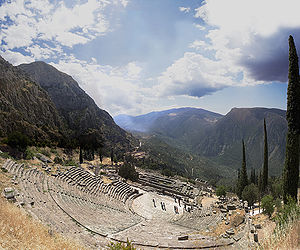
Back Griekse teater AF مسرح إغريقي Arabic Teatru de l'Antigua Grecia AST Древногръцки театър Bulgarian Teatre de l'antiga Grècia Catalan Starověké řecké divadlo Czech Theater der griechischen Antike German Αρχαίο ελληνικό θέατρο Greek Theatre of ancient Greece English Helena teatro EO






The theatre of ancient Greece was at its best from 550 BC to 220 BC. It was the beginning of modern western theatre, and some ancient Greek plays are still performed today. They invented the genres of tragedy (late 6th century BC), comedy (486 BC) and satyr plays.
The city-state of Athens was a great cultural, political and military power during this period. Drama was at its centre. Theatre was part of a festival called the Dionysia, which honoured the god Dionysus. In the Dionysia, the playwrights presented their work to an audience. It was a competition, with a winner and prizes. These two main genres were never mixed: they each had their own typical structure. Athens exported the festival to its colonies and allies in order to promote its way of life.
Only men were allowed as actors. The chorus were men, as were the actors.[1] Technically, they had to be citizens of Athens, which only applied to free-born men plus a few special cases.[2] The actors wore masks, so that the people would know which persona (character) the actor played.
The best known writers of plays are Aeschylus, Sophocles, Euripides for tragedies, and Aristophanes for comedies.
- ↑ "Fonseca, Reuben Ancient Greek Theater". Archived from the original on 2008-03-31. Retrieved 2013-11-04.
- ↑ Ewbank N. 2009.The nature of Athenian democracy Archived 2011-12-17 at the Wayback Machine Clio.